The Lawmatics Blog
Insights on legal marketing, automating the law practice, and legal tech in general
Law firm automation is the practice of centralizing and deploying repetitive, everyday administrative tasks at scale. It achieves this by linking every step of the client journey in one system to automate task triggers, emails, population forms, and reminders.
Legal workflow automation software like Lawmatics doesn’t replace attorneys but enhances them. It integrates with tools like Clio, MyCase, and PracticePanther for full workflow visibility.
Benefits of Legal Workflow Automation for Attorneys
Improved client intake speed and accuracy
Lawyer automation (or attorney automation) tools eliminate manual data entry and automate repetitive tasks at every step of intake, from confirming form submissions to client relationship management (CRM) data entry.
By automating processes like follow-up messaging and scheduling, teams can ensure faster responses and fewer client drop-offs.
As just one example, Lawmatics’ new QualifyAI tool automatically scores and prioritizes incoming leads based on engagement and case fit. This empowers teams to achieve an instant response time.
QualifyAI (and all other Lawmatics tools) is built on trusted internal workflows that help standardize processes and capture complete client information every time.
Reduced human error
Humans are, of course, essential to the operations of any legal practice, and that’s not changing any time soon. But law firms are busy environments, and in all the hustle and bustle, even the most skilled workers can make mistakes.
Legal workflow management software replaces manual document handling and repetitive data entry with automated templates and workflows. This prevents costly miscommunications and prevents tasks from falling through the cracks.
Automated task assignments and reminders also help prevent missed deadlines. For example, Lawmatics enables data sync across multiple systems, including Clio and MyCase, which further reduces inconsistencies.
Centralized data and transparent reporting
Legal practices should keep client data, communications, and metrics in one dashboard to prevent silos. Such centralization also gives managing partners visibility into firm performance and pipeline health in real time. Team members can make big strategic decisions with clarity.
Lawmatics comes with custom reporting tools that make it easy to tie marketing and intake directly to demo requests and revenue.
Streamlined follow-up and client communication
Strong client communication is at the heart of any successful legal team.
Legal workflow automation software allows teams to maintain consistent client contact through automated follow-up emails, reminders, and nurture sequences. With this set up, prospects remain engaged from first inquiry through signed retainer without laborious manual interview.
Lawmatics’ comes with built-in features, like text messaging for law firms, that allow teams to talk to clients and ensure no lead goes untouched.
Increased capacity without adding headcount
Labor costs are among the biggest concerns for a law firm. By automating tasks, law firms can scale their operations efficiently, handling more matters without expanding staff.
QualifyAI from Lawmatics empowers teams to convert more clients with less effort by routing qualified leads directly into workflows.
Lawmatics connects intake, CRM, and drip email marketing software for lawyers. This allows small firms to operate like large ones, using predictive insights that drive faster growth.
Core Legal Workflows Lawyers Can Automate
Legal document automation software has the potential to transform every essential task.
Client intake
Thanks to the large amounts of paperwork that it demands, the client intake process is the most lengthy part of any client lifecycle. Teams who use software can save time with automated intake forms, e-signatures, and data that syncs directly within the CRM.
Lawmatics’ built-in intake automation capabilities connect to follow-up workflows. Teams can save the effort involved in tracking down every client, sending reminders about pending documents like retainer agreements, and manually scheduling next steps.
Through QualifyAI, Lawmatics uses AI-powered lead scoring for law firms to accelerate intake by prioritizing the highest-value prospects first.
Marketing & follow-up
Firms that want to move beyond word-of-mouth client acquisition often spend a significant budget on marketing. Automation software can help reduce these costs by increasing conversation rates and decreasing acquisition costs through triggered drip campaigns, SMS updates, and personalized nurture sequences.
Lawmatics automates all of these processes within one unified dashboard. It makes it easy for teams to assess their marketing return on investment (ROI) at a glance. In turn, they save time and effort on reporting as well as on managing campaigns.
Case Management & communication
Clients who receive an exceptional experience are more likely to turn into promoters. However, firms chasing this exceptional experience can’t afford to miss deadlines or go radio silent during a retainer.
Lawmatics offers task reminders, automated deadlines, and document workflows to make sure every client feels cared for and prioritized. It can even sync with Clio and MyCase to ensure firm-wide synchronization.
Time tracking & billing
Billing and time tracking is an essential part of any law firm’s practice. If invoices are inaccurate, it can have implications on overall company margins,revenue, and reputation.
Lawmatics’ time-tracking tools link directly to invoicing systems, giving firms visibility into productivity and client value per matter. It empowers teams to make strategic, data-driven decisions about internal staffing needs and how to allocate capacity across clients.
5 Steps to Legal Workflow Automation
Law firm automation doesn’t happen overnight, but the process itself is generally straightforward and easy. Here’s how to make it happen.
Step One: Map your current legal workflows
To identify whether your team is a good fit for attorney automation, begin by mapping your legal workflows as they currently exist.
Then, either individually or together as a team, try to identify bottlenecks in intake, communication or billing. Based on the gaps you’ve identified, start writing possible solutions to those gaps. This will give you a list of which features to look for in a tool.
Step Two: Select the right legal workflow automation software
There are many automated legal platforms available on the market. While you’ll want to look for ones that provide the features you’ve indicated in Step One, there is another important factor to consider.
Look for a solution that integrates with your current tech stack. This ensures you can maintain the current operations that are working for you and discard those that aren’t.
Step Three: Start small with high-impact automation
Automation is powerful and, as a result, should be used carefully. It can be tempting to automate everything at once, but this can be quite overwhelming for a team.
Start with one process. Client intake automation is a great place to start. Then, measure results. If you see a positive change, you can move on to the next automation.
Step Four: Train your team for adoption and success
Law firm success depends on the output of the whole team. You need everyone on board in order for your automation efforts to be successful.
The best way to set your team up for success is by providing clarity and templates where possible. Most automation software is easy to learn. But, it can be helpful to go with a system that offers dedicated support in the first few months.
Step Five: Monitor and optimize your automated workflows
There are a few important reasons to monitor and optimize your automated workflows:
- To make sure everything you’ve implemented is serving both the team and the client.
- To make sure you’re receiving a great ROI from your software.
Lawmatics comes with a built-in reporting dashboard that makes it easy to track efficiency gains. Request a demo to see how Lawmatics can help you automate your specific legal workflows.
Common Legal Workflow Automation Challenges and How to Overcome Them
Lawyer automation software is generally simple to implement with amazing returns. However, it’s best to be aware of the possible challenges before you start an engagement. Here are some of the most common issues that law firms run up against:
- Fear of disruption: Fear of change is normal, and if change is associated with disruption and discomfort, the fear can be even worse. It can be hard to sell change-resistant teams on a new tool, especially if they think it’s going to make their job harder.
- Integration fatigue: Most teams have been through countless tools, which means multiple logins and multiple opportunities for headaches. It can be hard to sell a team on a new tool if they don’t truly believe it will make their lives easier.
- Inconsistent workflows: If a team is working on a shaky workflow foundation, it can be hard to know where to begin with automation.
Lawmatics answers all of the above concerns by unifying legal CRM software, automation, intake, and analytics in one easy-to-use platform. Plus, Lawmatics integrations connect with the software your team already uses every day, reducing the time your team spends juggling different systems.
The Future of Legal Workflow Automation: AI-Driven Efficiency
The next wave of legal workflow automation isn’t just about triggering tasks. It’s about software that can anticipate what needs to happen next.
With modern AI workflow automation, your systems can spot patterns in client behavior, score new inquiries, and trigger the proper follow-ups automatically—without adding more work to your team.
That’s where Lawmatics’ QualifyAI comes in. Built directly into Lawmatics' legal CRM, QualifyAI is a sophisticated lead-scoring automation engine designed specifically for law firms. Instead of treating every inquiry the same, it:
- Analyzes client behavior (form submissions, email engagement, response times).
- Reviews communication history and intake answers.
- Interprets engagement signals across your marketing and intake touchpoints.
From there, QualifyAI automatically ranks leads based on fit and intent, so your team knows exactly who to call first.
The benefits are immediate:
- Saves time qualifying leads by replacing manual gut checks with consistent, data-driven scoring.
- Prioritizes high-value clients, ensuring your best opportunities get a faster, more focused response.
- Improves marketing ROI by connecting campaigns and channels to the leads that actually convert.
By pairing AI-driven lead scoring with automation across intake, communication, and reporting, Lawmatics is helping firms move from reactive to truly proactive operations. It’s a clear example of how AI doesn’t replace attorneys—it gives them better information, faster, so they can make stronger decisions.
As AI continues to advance, firms that embrace data-driven workflows will gain a lasting edge: fewer bottlenecks, more predictable growth, and a practice that runs as intelligently behind the scenes as the lawyers who lead it.
Transform Your Firm’s Legal Workflow with Lawmatics
Automation isn’t just about convenience for staff. It’s one of the most reliable ways for law firms to increase profitability and deliver a stronger client experience.
By removing repetitive manual tasks, firms can operate with more consistency, more speed, and far fewer administrative bottlenecks.
Lawmatics makes this possible by streamlining every workflow from initial intake through engaging repeat clients. Its unified system gives firms complete transparency into what’s happening at each stage of the client journey.
Backed by real-time legal analytics and reporting tools, it helps teams make confident, data-driven decisions. QualifyAI pushes these gains even further, giving firms predictive insight into their best opportunities. This way, they can prioritize the right clients at the right moment.
Request a demo to see how Lawmatics transforms legal operations.
Frequently Asked Questions
How can automation help my law firm?
Automation increases efficiency, reduces human error, and helps firms scale without hiring more staff. It frees attorneys from administrative work so they can focus on strategic, billable client work.
What legal tasks can be automated?
Tasks like client intake, document generation, follow-ups, billing, scheduling, and marketing outreach are all strong candidates for automation.
Is legal workflow automation only for large firms?
Not at all. In fact, small and midsize firms often stand to gain the most from automation.
Large firms may use enterprise systems to streamline complex, multi-department workflows. Meanwhile, smaller firms may rely on automation to offset limited staff, improve consistency, and scale client intake without adding headcount.
How does Lawmatics support automation?
Lawmatics combines CRM, client intake, and a legal marketing automation platform into one. The whole platform is supported by QualifyAI, which automatically scores and prioritizes leads for faster response times.
Will automation replace lawyers?
No. Automation handles repetitive tasks so attorneys can focus on legal strategy, client relationships, and work that requires human judgment.
Why automate legal workflow processes?
Automation saves time, reduces errors, and creates consistent, streamlined workflows. It helps firms boost productivity, enhance client satisfaction, and scale without expanding staff.
Legal billing is a fundamental aspect of the legal profession that ensures fairness, transparency, and accountability in financial transactions between attorneys and their clients. Legal software facilitates fair and accurate billing and plays a crucial role in supporting prompt payment for the delivery of quality legal services.
What is legal billing?
Legal billing is the process of invoicing clients for legal services provided by attorneys or law firms. It involves documenting the time spent on various tasks, such as consultations, research, court appearances, and document preparation, and then assigning appropriate billing rates to calculate the fees owed by the client.The main components of legal billing include:
- Time tracking: Attorneys track their time spent on different tasks using timekeeping systems that record activities in specified time increments, such as tenths of an hour.
- Rates: Attorneys typically have different billing rates based on factors such as their experience level, expertise, and the type of work performed. Different tasks may be billed at different rates.
- Invoicing: Once the time is tracked and rates are applied, the law firm generates invoices for the client that outline the services provided, the time spent on each task, and the total amount due.
- Expense tracking: Besides legal fees, clients may be billed for expenses incurred while providing legal services, including court filing fees, travel expenses, and other out-of-pocket costs.
- Guidelines: Some clients, particularly large corporations or government entities, may have specific billing guidelines that law firms must follow regarding timekeeping, rates, and the format of invoices.
Why is legal billing important?
Legal billing is essential for several reasons, both for the legal professionals providing services and for their clients. Legal billing helps promote:
- Fair compensation: Legal billing ensures that attorneys and law firms are fairly compensated for the time, expertise, and value they bring to their clients.
- Transparency: Detailed and accurate billing provides transparency to clients regarding the services rendered and the associated costs.
- Client understanding: Billing statements help clients understand the specific tasks and the amount of time spent on their legal matters and allow them to appreciate the complexity and effort involved.
- Business viability: Proper billing is essential for the financial viability of the law firm. It ensures that the firm can cover its operational costs, pay its staff, and invest in resources necessary to provide quality legal services.
- Resource allocation: Billing allows law firms to analyze how their resources, including attorney time, are allocated across various cases and tasks—valuable information for making informed business decisions and improving efficiency.
- Regulatory compliance: Legal billing practices are often subject to regulations and guidelines set by legal authorities and bar associations, and adhering to these regulations helps law firms avoid legal and ethical issues.
- Client accountability: Accurate billing holds clients accountable for the financial aspects of their legal matters, establishes a formal agreement on payment terms, and reduces the likelihood of fee disputes.
Accurate and transparent legal billing builds and maintains trust between attorneys and clients, helps clients understand the value of the services provided, and ensures that law firms are compensated for their time and expertise. However, disputes over billing practices can sometimes arise, emphasizing the importance of clear communication and detailed invoicing.
What are five methods of billing clients in a law firm?
Law firms use various billing methods to charge clients for the legal services they provide. The choice of billing method often depends on the type of legal work, the preferences of the client, and industry standards.
What are the most common types of billing methods in a law firm?
Here are some standard billing methods used by law firms:
- Hourly: Attorneys bill clients based on the number of hours worked on a particular matter.
- Flat fee: Clients are charged a fixed, predetermined fee for a specific legal service or the entire legal matter
- Contingency: The firm is paid a percentage of the client's recovery if the case is successful; however, if the case is unsuccessful, the firm receives no fee.
- Retainer: Clients pay an upfront fee to secure the services of the law firm, and the firm draws from this retainer as work is performed.
- Hybrid or blended: Combines elements of different billing methods, such as hourly billing for specific tasks and flat fees for others.
The choice of billing method depends on factors such as the nature of the legal work, client preferences, and the level of predictability desired for both parties involved, and it’s common for law firms to use a combination of these methods depending on the circumstances of each case.
How do you create a billing system?
Creating an effective billing system for a law firm involves several steps to ensure accuracy, transparency, and efficiency. Here's a step-by-step guide:
- Understand client preferences: Identify the types of clients the firm serves and understand their preferences for billing methods.
- Define rates and structures: Establish billing rates for attorneys and other legal professionals based on factors like experience, expertise, and the nature of the work.
- Implement timekeeping procedures: Attorneys and staff should record their time accurately, describing the tasks performed and the time spent on each activity.
- Establish policies: Define billing policies—billing increments, expense reimbursement procedures, and any applicable discounts or promotions—and explain them to attorneys and clients.
- Create billing templates: Develop standardized billing templates or invoices that include essential information, such as the client's name, date, description of services, time spent on each task, and any applicable expenses.
- Set retainer policies: Establish clear policies regarding retainer amounts, how they will be applied, and when clients must replenish them.
- Integrate expense tracking: Implement systems for tracking and billing client-related expenses, including costs for court filing fees, travel, copies, and other out-of-pocket expenses.
- Establish billing cycles: Define whether billing cycles are monthly, bi-monthly, or based on specific project milestones.
- Provide detailed invoices: Invoices must provide detailed information about the services rendered and include descriptions of tasks performed, the date of each activity, the hours spent, and any associated expenses.
- Monitor accounts receivable: Implement systems to monitor accounts receivable, follow up on overdue payments, send reminders, and begin collection procedures as necessary.
- Review and update billing practices: Regularly review and update billing practices to ensure they align with the evolving needs of the firm and its clients.
- Guarantee compliance: Ensure that the billing system complies with legal and ethical standards of relevant regulatory bodies and bar associations.
Establishing a well-organized and transparent billing system is crucial for the financial health of a law firm and the satisfaction of its clients. Regularly reviewing and refining the billing process helps ensure its effectiveness over time.
What is legal billing software?
Law firms have unique and complicated billing requirements. ma solo practitioners and small firms must track hours, account for retainers, and manage a variety of rates and billing options. Dedicated legal billing software—specialized software designed to help law firms and legal professionals manage the billing and invoicing process for legal services--can simplify the process and allow firms to capture more billable hours and subsequently increase revenue.
What is a good billing software?
Functional yet simple legal billing software is characterized by a combination of features, functionality, and user-friendly design that addresses the specific needs of law firms. Here are some key attributes to look for:
- User-friendly interface: An intuitive and user-friendly interface is crucial for ease of use. Legal billing software should be accessible to attorneys and staff with varying levels of technical expertise.
- Comprehensive time tracking: The platform should offer strong time-tracking abilities, with options for manual entry, timers, and the ability to associate time entries with specific tasks.
- Flexible structure: First-rate legal billing software provides flexibility in setting up billing rates and structures and accommodates different billing arrangements, such as hourly rates, flat fees, contingency fees, and more.
- Seamless automation: Legal billing software should automate the invoicing process, with the capability for recurring invoices, batch invoicing, and customizable invoice templates.
- Reimbursement tracking: Robust expense tracking features enable law firms to record, categorize, and bill clients for reimbursable expenses and support easy reimbursement to clients whenever necessary.
- Accounting integration: Legal billing software platforms must seamlessly integrate with accounting systems, facilitating accurate financial management by syncing billing data with general ledger systems.
- Advanced analytics: Advanced reporting tools provide insights into the firm's financial performance related to billable hours, collected revenue, outstanding invoices, and client profitability.
- Client portals: Online client portals enhance transparency and client communication by allowing clients to securely access their invoices, track expenses, and view the status of their legal matters.
- Reminders and notifications: Modern legal billing software automates reminders for upcoming deadlines, retainer replenishments, and overdue invoices to help law firms stay organized and ensure timely follow-ups.
- Security and compliance: The best legal billing software systems prioritize security and compliance by providing robust data encryption, secure user access controls, and adherence to privacy regulations.
- Scalability: The software should be scalable to accommodate the growing needs of a firm, whether it is a small practice or a large enterprise.
- Mobile accessibility: Access through mobile applications or responsive design ensures that users can manage billing and invoicing tasks on the go, enhancing flexibility and responsiveness.
- Customer support and training: A responsive and accessible customer support team and adequate training resources contribute to the overall excellence of legal billing software.
- Regular updates and innovation: The software should receive regular updates and improvements to address evolving industry needs and ensure that the software remains current and relevant.
By leveraging these features, legal billing software provides law firms with the tools needed to efficiently manage billing processes, enhance client relationships, and maintain financial transparency.
Is there a free billing software option?
Yes, there are free legal billing software options available, such as ZipBooks, Wave, and Invoice Ninja. These platforms may be suitable for smaller law practices or individual practitioners who are looking for basic billing functionality without the cost associated with premium software. However, while these tools offer free versions, they may have limitations compared to premium legal billing software. Additionally, the free versions might include ads or watermarks on invoices. Paid legal billing software typically provides more advanced features, better support, and compliance with legal industry standards.
What programs are compatible with Quickbooks?
Several legal billing programs offer integration with QuickBooks, including:
- Clio. A popular legal practice management software that seamlessly integrates with QuickBooks Online, Clio helps manage billing, trust accounting, and financial reporting more efficiently.
- Rocket Matter. A cloud-based legal billing and management solution built for small and midsize law practices, Rocket Matter offers calendaring, document management, and payments and collaboration management portals.
- LawPay. The leading provider of credit card accounts for law firms, LawPay makes it easy to accept online payments and services for both operating and trust accounts.
Lawmatics legal software integrations seamlessly incorporate these and other legal billing applications your firm might already use to automate repetitive tasks and streamline operations.
What is the best legal software for small firms?
The best legal billing software for solo lawyers and small firms offers valuable features like:
- Customization for billing rates and structures
- Retainer management
- Automated recurring invoicing
- Ability to track billable hours and expenses
- Matter management
- Bill sharing capabilities
- Integration with accounting systems
- Secure client portals
Lawmatics’ legal billing software for small firms automates each step in the billing process — everything from invoice creation to invoice sharing, payment collection, and payment status. With Lawmatics, all logged time entries on your matters are pulled directly into your invoices as line items, making for easy and on-demand legal billing and invoice generation. You can even include line items with details such as fund deductions from trust balances, remaining trust account balances, and more for maximum transparency.
How much does legal software cost per month?
The cost of legal software varies depending on the functionalities offered, the size of the law firm, the number of users, and whether the software is cloud-based or installed locally. For small firms with limited resources, legal software is an investment that saves time and money and creates efficiencies.
“
“Lawmatics saves you so much time and money that you're actually losing money by not using Lawmatics.”
— Conti Moore Smith, Conti Moore Law, PLLC
To learn more about the best-in-class tools Lawmatics provides for legal billing and much more, request a demo today.
Recent years have seen consistent growth in the legal industry. As we look ahead to 2024, emerging dynamics like economic factors, talent retention, and technology adoption present potential profitability challenges for law firms. Small, midsized, and solo firms may be especially impacted due to their tighter margins.The great news is that, according to LexisNexis GLP, sector growth is forecasted in areas of the legal field like litigation, immigration, and family law. Law firms not in these sectors could diversify to position themselves for success.Let’s walk through 8 major risks to law firm profitability and how to mitigate risks through proactive planning and innovation by taking stock of financial metrics, marketing channels, technology utilization, and talent retention. By protecting your firm’s financial health through resilient, agile strategies, you can continue serving clients at the highest levels while safeguarding their bottom line.
Navigating 2024's risks landscape for law firm financials
Entering 2024, law firms need strategic foresight and adaptability as they confront many factors that could impact their financial health. From economic shifts to the integration of emerging technologies, the challenges are as diverse as they are significant.
1 Economic uncertainty
Building resilience through monitoring performance
Although no recessions are forecasted for 2024, a projected slowdown in growth for the legal industry poses significant challenges for small and solo law firm’s profitability, which typically already operate on narrow profit margins. The key to navigating slow growth years lies in strategic performance monitoring, specifically through effectively using the following key metrics:
Utilization rate
Utilization rate is the percentage of hours devoted to billable work (the direct driver of revenue generation). Optimizing this rate involves adjusting staffing levels and case volumes to meet current demand. You can establish a firm-wide target for utilization rate to help assess overall performance and regularly review your legal staff’s schedules to ensure maximum capture of billable time.
Realization rate
The realization rate represents the proportion of work performed that clients actually billed and paid. You can compare realization rates with utilization rates to identify areas where profits are lost due to written-off work. Provide ongoing training to staff to minimize write-offs. Again, regularly reviewing unbilled time can pinpoint areas that need attention.
Collection rate
Critical to maintaining cash flow, the collection rate is the percentage of billed fees that are successfully collected. Effective invoicing practices and proactive receivables management are absolutely non-negotiable. A proven way to collect fees faster is to accept all payment methods and use online payment software. Consider setting a target collection rate and regularly evaluate the efficiency of your billing and invoicing processes.Beyond these law firm profitability metrics, you should also review seasonal trends specific to their practice areas. Understanding monthly fluctuations based on historical data enables firms to better prepare for periods of varying demand.
2 Market consolidation
Rapid industry consolidation reshaping the competitive landscape
The legal industry is undergoing rapid consolidation through increasing mergers and acquisitions. Data from Fairfax Associates shows 46 law firm mergers completed in 2022, up from 41 in 2021. Large firms strategically acquire niche specialists, while mid-sized firms merge to stay competitive.For most small firms, this market consolidation poses significant challenges. In 2022, most mergers involved these smaller firms, emphasizing the pressure to consolidate to remain viable. With only two mergers involving firms with over 100 lawyers each, the focus is on larger firms absorbing smaller ones. Consequently, smaller and solo legal practices now face the demanding task of competing with broad-based entities boasting greater capacity and resources.Consolidation also presents opportunities for agile smaller firms. Small firms can create profitable openings not addressed by larger generalist competitors by concentrating on specialized expertise and delivering tailored services to niche markets. Leveraging your specialized knowledge and close client relationships, your firm can provide unique value to your community.Smaller practices must proactively evaluate their strategic positioning, considering potential mergers with similar specialty firms to create more robust, differentiated entities that can thrive amidst consolidation.
3 Competition and market saturation
Navigating an increasingly competitive legal landscape
Law firms today face mounting competition in an already saturated legal services market. The proliferation of online legal providers and the encroachment of large consultancies have intensified the need for differentiation, especially among small and mid-sized firms.Market saturation is highly apparent in regions like South Florida or Long Island, where the sheer density of lawyers creates fierce competition for clients. Many firms heavily invest in marketing, particularly search engine optimization (SEO), to attract potential clients online. Local SEO strategies can notably boost visibility among nearby searchers looking for specific legal services.But as we’ve seen, the legal SEO landscape is intensely competitive. Law firms devote substantial resources to search rankings, content, and other SEO elements. Complicating matters are issues like black hat tactics and complex advertising rules.Stop waiting around and get into the game and make sure your law firm has an SEO strategy to boost your visibility and attract potential clients online. A practical SEO approach drives website traffic and lead generation and conveys authority and trust. Good online visibility can guide potential new clients straight to you. Bonus points if you implement intake tools to capture and convert your SEO leads.Read more:Does SEO Work for Law Firms?
4 Client acquisition channels
Building referrals through exceptional service
Identifying high-potential marketing channels and using technology to streamline lead intake are key strategies for optimizing client acquisition. During slower growth periods, ensure your intake process captures and converts every solid lead. Analyzing which marketing activities deliver quality clients also allows you to allocate resources strategically.
Review successful marketing channels
Conduct assessments of your marketing activities using data-driven analytics. Track lead generation rates and conversion ratios by channel to gauge return on investment. Evaluate client profitability by originating channels to determine where top-tier clients come from. These insights inform your future investments by identifying existing strengths.
Cultivate your referrals network
Grow your referral networks and community involvement to access qualified leads. Building connections in your field, delivering consistent and excellent service, and nurturing a solid professional reputation will organically drive referrals over time.
Build and regularly train an effective intake team
Leverage workflow automation tools, analytics software, and customer relationship management (CRM) systems to enable your team to capture and manage interactions seamlessly. Comprehensively train staff on communication best practices and client management strategies. An equipped intake team will convert leads into lasting client relationships.
Assess efforts through data analysis
Use hard metrics to gain actionable insights. Track conversion rates to gauge intake effectiveness. Seek client feedback early on to improve their experiences. Evaluating performance across acquisition channels and strategies will inform data-driven decisions for profitable growth.
Deliver service excellence
Make exceptional service and CRM optimization pillars of your client retention strategy. Resolve issues proactively to prevent escalation. Offer customized solutions tailored to each client’s needs. Routinely evaluate service offerings to identify potential new areas aligned with emerging client demand.
5 Technological adoption
Technological adoption requires measured investments
Adopting new legal software is increasingly vital for law firms to remain competitive. Yet, simply purchasing a new tool is insufficient–you need integration plans to achieve results firm-wide. This requires budgets to procure solutions and change management processes that train staff to use tools daily to enhance productivity.While workflow automation, AI document review, and data analytics promise efficiency gains, these leading-edge tools demand disciplined implementation. Per the 2022 ABA TECHREPORT, 71.4% of solo practitioners increased tech budgets–a major spend for lean teams, but only 31.8% received adequate training on new tech. Instead, they bootstrap and self-teach through informal Google searches. In a shockingly high amount, over 50% of the respondents reported frequent tech problems hurting productivity.
Table 1: Steps for seamlessly adopting new legal software
Check Compatibility FirstTest new tools to make sure they will integrate smoothly into your existing firm software to avoid service disruptions.Verify Strong Customer ServiceSupport is crucial, and should be iincluded with any new technology for prompt user guidance and troubleshooting when needed.Budget for TrainingTemporarily reduce billable capacity and allocate time for formal training so your team can skillfully use the systems.Consult ExpertsFeeling out of your element? Talk to a legal tech specialist for advice on selecting the right solutions for your law firm.Support Usersfrom the StartCreate change management structures like training guides and document processes so your existing team and new hires can train on tech.Track PerformanceRegularly assess new software's impact on productivity and profit margins to validate the investment.With focus, planning, and a strategy, advancing your firm with tech can be seamless—budget adequately for software, training, and implementation governance. Construct gradual integration plans and equip staff with support and skills at every phase. Monitor progress and tune workflows as you go.
6 AI and your law firm
Harnessing AI's potential while protecting profits
Without a doubt, 2023 was the year of Artificial Intelligence (AI), especially for Generative AI. And it makes sense–AI holds awesome productivity opportunities for law firms. AI offers the chance to automate routine tasks, cut down on unnecessary expenses, and increase your team's capacity. However, introducing new AI tools into your practice comes with risks. You might face challenges if you don't fully understand what these tools can do or haven't set up the right policies and processes.
Setting realistic expectations with AI
Current AI technology has its limitations. Don't expect legal workflow automation tools to instantly boost your profits, especially when considering the costs for customization and staff training. A common mistake is to overestimate how advanced these technologies are.Instead, adopt AI step by step, and your firm can smoothly transition and be ready to make the most of future advancements in AI.
How to cautiously implement AI in your firm
To make sure that AI adoption boosts your profitability, focus on the following areas:
- Vetting solutions: Before you commit to an AI solution, check it thoroughly for reliability and how well it works with your current technology.
- Education and oversight: Make sure the lawyers in charge of bringing in AI understand the tool's capabilities and limits. They should work on setting up the right policies and training your team effectively.
- Total cost of ownership: Consider the entire cost of owning an AI tool, including initial purchase, ongoing upkeep, updates, and integration costs.
- Enhancement, not replacement: View AI as a tool to boost your legal expertise, not replace your professional judgment and duties.
- Balancing convenience and output: Weigh the benefits an AI tool brings against its actual performance and how it will affect your firm's operations.
Introducing AI into your law firm can greatly impact your profits, but that depends on how well you manage the risks. Setting realistic expectations and having a strategic approach for use, you can use AI to improve your firm's efficiency,
7 Talent management
Recruiting and retaining talent amid increased mobility
In 2024, talent management presents both a challenge and an opportunity for midsized and small law firms. The legal industry faces significant challenges in hiring and retaining great talent, especially in a post-COVID era characterized by hybrid and remote working preferences. The Wolters Kluwer’s Future Ready Lawyer survey reveals that 81% of lawyers identify recruitment and retention as crucial factors impacting their operations.
Embrace technology and remote work
These days, lawyers and legal professionals want to work at firms that are up-to-date with technology and have the flexibility to offer them the choice to work remotely. If your firm can provide these options, you're more likely to attract young, energetic professionals.
Specialization over generalization
There's a big demand for attorneys who are experts in specific areas rather than generalists who cover many fields. Encourage a workplace culture where your team can become experts in particular legal areas to attract sharp minds and also give your team members exciting career paths to follow.
Invest in professional development
Offering opportunities for your team to learn and grow is a game-changer. Provide training and chances for career advancement. People who feel like they're growing professionally are more likely to stick around.
Create a supportive work environment
Everyone wants to work where they feel supported and valued. Make your firm a place where achievements are celebrated, feedback is constructive, and a healthy balance between work and life is encouraged. Happy employees = loyal employees.
Competitive compensation and benefits
While you might not match the big law firms dollar for dollar, offering a good salary and benefits package can be a huge draw. Health insurance, 4-day work weeks, retirement plans, and daycare programs are the things that make people feel cared for and valued.For small and midsize law firms, talent management is all about creating a supportive workplace focused on each team member's growth and well-being.
8 Work-life balance and burnout
Supporting legal professionals wellbeing to sustain productivity
For solos and small firms, the mental health of these staff directly impacts your overall law firm health. Burnout and poor work-life balance can lead to decreased productivity, lower quality of service, and, ultimately, reduced employee satisfaction and talent retention. This is particularly impactful in smaller firms where the number of practitioners is limited, and each lawyer's contribution is critical to the firm's overall performance.Burnout in the legal profession is often characterized by chronic stress, exhaustion, and a feeling of inefficacy. Burnout diminishes a person's ability to engage effectively with clients and manage cases efficiently. The 2023 Clio Legal Trends Report suggests that lawyers working beyond traditional hours and accommodating clients during evenings or weekends are more susceptible to burnout. This overextension can lead to decreased efficiency, mistakes, and a drop in the quality of legal services provided.
Work-life balance as a competitive advantage
Making sure your staff maintains a healthy work-life balance can be a competitive advantage for talent recruitment and retention. Legal professionals who achieve this balance tend to be more focused, creative, and efficient. Solo lawyers who leverage technology effectively can manage their workloads better, allowing for more flexibility and the autonomy to work at optimal times.
Technology as a balancing tool
Cloud-based technologies and legal practice management software have enabled solo practitioners to work more flexibly and efficiently. These tools allow legal teams to access files remotely, automate administrative tasks, and streamline client communication, reducing the time spent on non-billable tasks and allowing for more control over their schedules.
Empowering your law firm for a profitable 2024
2024 is teeming with tech advancements, shifts in mental health awareness, and evolving legal talent recruitment strategies. It’ll be a unique challenge for any law firm hoping to thrive. But your firm can effectively leverage these opportunities with a blend of strategic foresight and innovative thinking.Address current challenges with deliberate action, preparing for the uncertainties that lie ahead. Your firm can mitigate the apprehension of change by thoughtfully integrating innovations into your law firm vision and values. Readiness for the future is not just about being prepared. It's about making continual progress.Your firm stands at the cusp of significant growth, innovation, and leadership within the legal sector. Seize these opportunities by partnering with Lawmatics. Request a demo today to see how we can help you in 2024.Here’s to a year of transformation and prosperity for your law firm!
Lawmatics is thrilled to kick off the new year with a trio of exciting features to elevate your practice. Let's dive into the heart of our latest release, where innovation meets efficiency.
Trigger Automations based on appointment adjustments
No-shows and cancelations happen — it’s inevitable. Lawmatics can now trigger automations in response to these appointment disruptions. This ensures that your client interactions remain seamless, even when plans shift. Updating the matter’s status, assigning a task to a staff member, or sending a new booking form to the client has never been easier thanks to this new automation trigger.
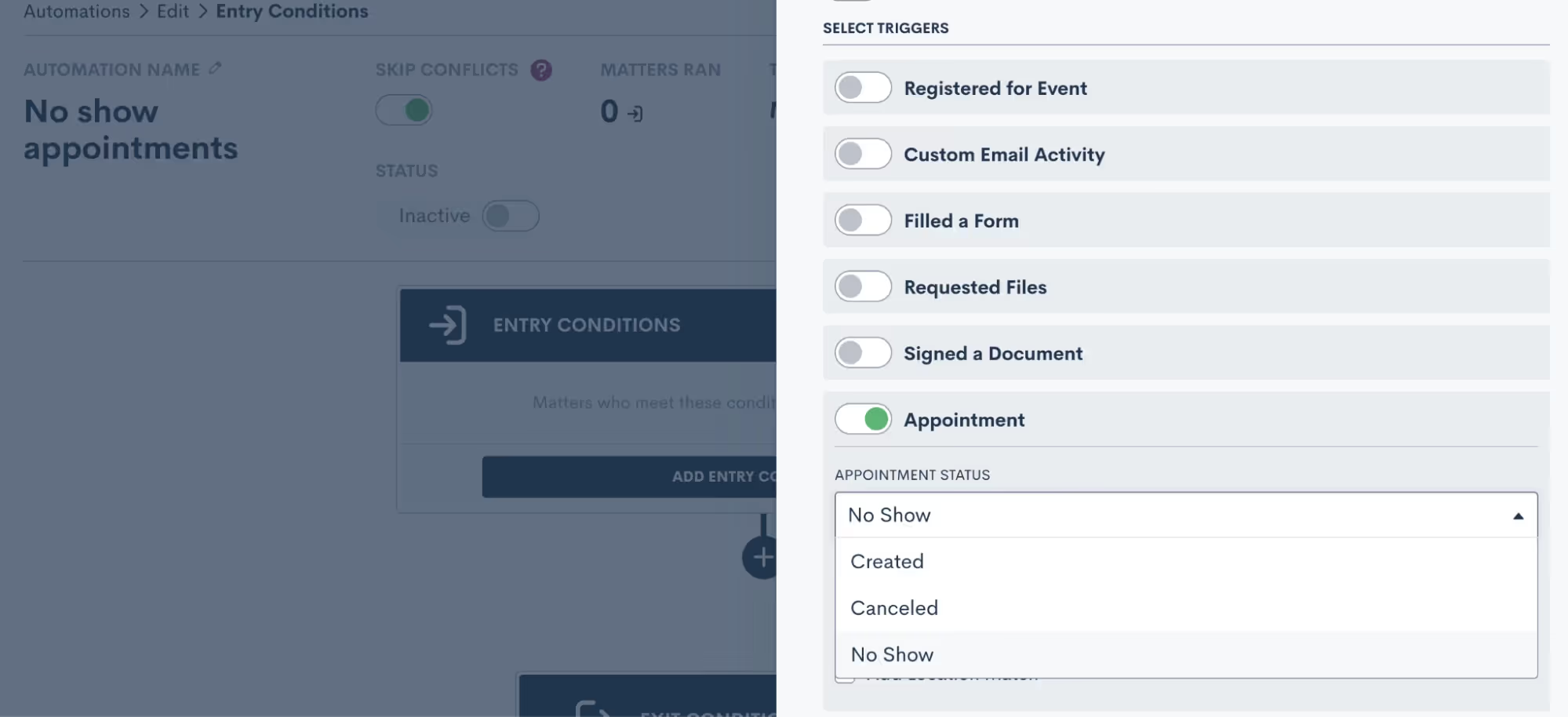
Learn more here.
Create custom no show/cancelation emails
To aid you in reaching out about appointment changes, Lawmatics now has built-in email templates to help you touch base with clients and prospects in instances of no shows and cancelations. Whether you adapt the templates into one-off emails you send manually or incorporate them into an Automation, these emails tailor your communication to any change of plans.
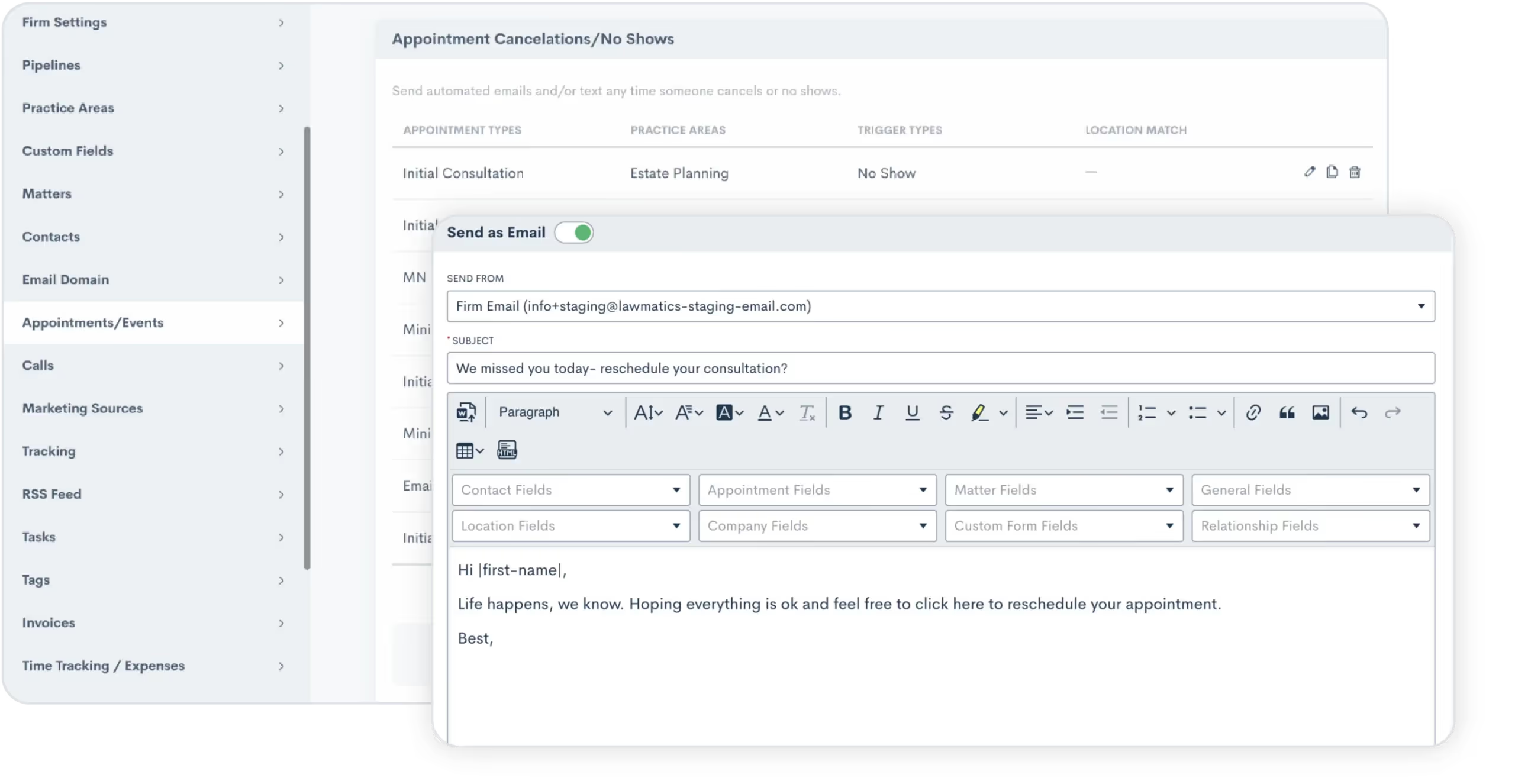
Read more about this feature.
Effortless file sync with OneDrive integration
Lawmatics now seamlessly integrates with OneDrive, providing you with the power to sync files between Lawmatics and Microsoft’s cloud file hosting service. With this two-way sync, the two platforms work together to keep critical folders and files up-to-date in both platforms. This integration guarantees that your legal documents and resources are always at your fingertips, enhancing collaboration and accessibility.
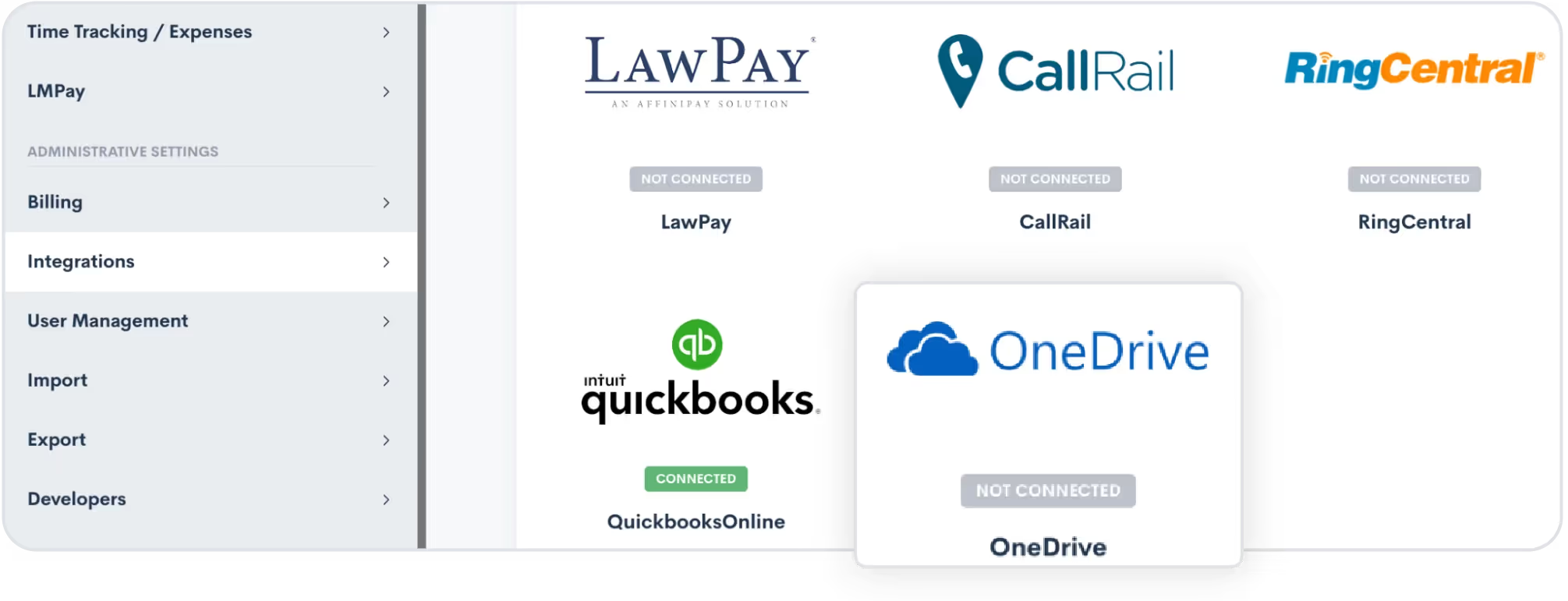
Please contact support if you would like OneDrive turned on for your account.As always, we love your feedback and encourage you to reach out with any questions or suggestions. Thank you for being a valued member of our community. Together, we continue to push the boundaries of what's possible for law firms.Sign in or sign up to get started with Lawmatics today.
In a competitive legal marketplace, it’s imperative for attorneys to find the most time-efficient way to get real value when networking. The saying used to be, “It’s all about who you know.” Today, it’s about how you leverage those you know.In this webinar, Lawmatics Co-Founder and CEO Matt Spiegel is joined by Steve Fretzin, a four-time author, host of the Be That Lawyer podcast, and business coach with over 20 years of experience working on legal business development for lawyers. Together they share how to network your way to increased profitability.
Time stamps of key takeaways
0:00 — Introductions
If you’ve never met Matt or Steve before, this is your chance! Get to know a little about the pair, including an overview of their backgrounds and even their current favorite podcasts.
9:26 — Better time management
Time management is a combination of personal habits and business philosophy. Steve has some resources and recommendations for strengthening both. It all starts with getting organized and establishing your priorities.
17:51 — Creating a sticky infomercial
No, you don’t actually have to film an infomercial. This is about developing a strong personal brand, one that includes an effective elevator pitch for your services. In this part, Steve and Matt break down the keys to developing a quick explanation of your ‘what’ and ‘why’ that sticks with your audience.
35:00 — Identifying your best networking targets
Your networking targets can likely be described in three groups: prospective clients, strategic (referral) partners, and centers of influence. Once you figure out your target audience for each of these groups, you’ll need to identify the best channels and opportunities to access those targets. Here, Steve has some tips for how to build an effective strategic network.
43:22 — Networking with purpose
Simply reaching your target audience isn’t enough. Building relationships requires you to be proactive in order to sustain momentum. In this part, Steve has some recommendations for how to bring structure to your networking meetings so that they’re productive for both you and your partner.
49:46 — Leveraging the low-hanging fruit to drive new business
When it comes to referrals, you have to both identify whether the referral is a good fit and bring a personal touch. That’s why introductions are everything. A structured introduction allows you to bring the best of both worlds in an efficient and effective way. Check out this part for one essential question Steve uses to quickly qualify referrals and potential clients.
55:48 — Q&A
Stick around as Matt and Steve field audience questions about network scripting, best practices for employing your infomercial, how to politely decline requests, and more.
Webinar slide deck
Advances in legal software are rapidly transforming the future of legal technology. Solutions leveraging automation, AI, and cloud platforms are reshaping law practices of all sizes. But for small and mid-size firms, the most transformative innovations are tools that directly strengthen client relationships, service quality, and firm capabilities.Small law firms occupy a unique position where owners must balance legal practice and business ownership. Integrating the right technology promises to augment both roles by improving efficiency, insight, and competitive differentiation. As technology permeates the legal field, small firms' nimbleness could become an advantage in actively adapting to changing client expectations faster than larger rivals.New solutions democratize sophisticated capabilities, leveling the playing field. Lean small firms can deliver elite responsiveness and convenience by carefully integrating customer-focused technologies designed for legal teams.
Technology in law firms: a shifting landscape
Small law firms actively invested in technology integration to streamline operations, strengthen security, and satisfy rising client service expectations, according to The 2023 State of U.S. Small Law Firms Report. The report confirms that over 40% of small practices have recently adopted new solutions, with law-specific software and agile cloud platforms representing top focus areas and investment in the coming year.As law firms accelerate tech investments, top solutions driving transformation include:
1Workflow automation: boosting productivity
Streamlining repetitive tasks from intake to billing via automation allows professionals to focus on high-value work. Reducing administrative workflows has been a major priority for law firms in the last few years, but there is still an opportunity to review billing processes. According to the ABA, only 52% of solo attorneys use time and billing software, and small firms aren't much better, with 66% leaning into the ease of a billing workflow.
2AI-enabled technology: promise amid uncertainty
Fewer than 15% of small firm lawyers view rapidly developing AI as an imminent threat to traditional legal roles. Many remain open, even cautiously optimistic, about AI’s potential for strengthening firms' expertise offerings and efficiency over time. As initial legal AI tools emerge focused on functions like contract analytics and workflow support, nearly 40% envision meaningful process automation opportunities – though uncertainty persists over how quickly evolving AI will transform daily operations.
3Cloud-based practice management: collaboration and integration
With robust cloud platform adoption facilitating remote work flexibility and information sharing - relied upon by 84% of solos and 74% of mid-sized firms - continued security-focused infrastructure investments are critical amid digitizing client interactions and data access expectations.
4CRM: strengthening client relationships
CRM technology enables systematically tracking interactions and mining institutional knowledge to uncover client insights and opportunities – potentially transformative capabilities, especially among relationship-driven small practices. However, CRM adoption reaches just 39% among small firms and dips below 25% for many solo and mid-sized practices, signaling a largely untapped growth avenue.
5Client portals: convenience and collaboration
Despite widespread availability, only 17% of solos and 25% of small firm practitioners provide client portal access for convenient document sharing and real-time support. Closing this gap could represent a substantial opportunity to satisfy rising client expectations of 24/7 digital access and mirror commercial conveniences available in other sectors (e.g., medical).
What is the most used legal technology?
According to the 2022 ABA Solo and Small Firm Tech Report, the most widely adopted areas of legal technology are practice management and conflict-checking solutions. The data shows that 45-46% of these smaller practices have implemented technology in these areas, indicating that streamlining workflows and efficiency are top priorities.
How technology is transforming the legal field
Increasingly, law firms are embracing technology to improve efficiency and service quality. The strategic adoption of legal tech is changing the legal field by automating routine tasks, providing data-driven insights, and enhancing client experience.
1Driving efficiency gains
Solutions like document automation, eSignature, and contract lifecycle management streamline repetitive workflows. By leveraging these tools to work smarter, firms gain productivity and reduce overhead. The operational efficiency gains let professionals concentrate on higher-value complex tasks.
2Enhancing decision-making
Advanced analytics utilize AI and vast data sets to uncover insights, patterns, and predictions to inform strategy better. Analytics assist with tasks ranging from case strategy to pricing optimization to identifying client issues faster. Data-empowered decisions create a competitive advantage.
3Optimizing client service
Client portals, smart intake forms, and customer relationship management platforms provide superior experience and responsiveness. By centralizing client communication and data, firms gain a 360-degree client view - enabling personalization and anticipating needs. The focus shifts to continuous client collaboration.
4Attracting top talent
Cutting-edge systems indicate forward-thinking, innovation-focused workplaces that align with in-demand skill sets. Leveraging the latest solutions shows commitment to optimizing workflows and providing a technology-powered competitive edge. This helps attract top candidates and satisfies the expectations of tech-native employees.As this transformation accelerates, the impact of technology on law will only grow - rapidly changing traditional law practice methods. Firms must actively adapt through strategic adoption to keep pace.
What are the legal technology trends in 2024?
Key law firm technology trends in 2024 included further automation, increasing adoption and integration of analytics and AI, and a growing focus on interfaces tailored for legal work instead of generic business tools.Solutions like Lawmatics focus on streamlining client intake, centralizing communication, and enhancing customer experiences - capabilities once siloed in costly enterprise practice management systems.With the right foundation, forward-looking adoption also future-proofs smaller firms to capitalize on coming AI advances. As this legal transformation continues gaining speed, harnessing select innovations can cement sustainable advantages.Discover how Lawmatics can catalyze your firm's growth and efficiency. Request a demo today.
2023 has been a huge year here at Lawmatics! We continued to break ground on legal innovation, added even more features to the most robust made-for-legal CRM on the market, and teamed up with some of our friends across the legal world to make managing your business easier.If you haven’t been following us all year, or if you just need a refresher on all that we’ve been up to, here’s our recap of 2023.
We launched game-changing features
This year we unveiled some major milestones in making our platform even easier to use. Some of our biggest developments include:
Revamped user experience
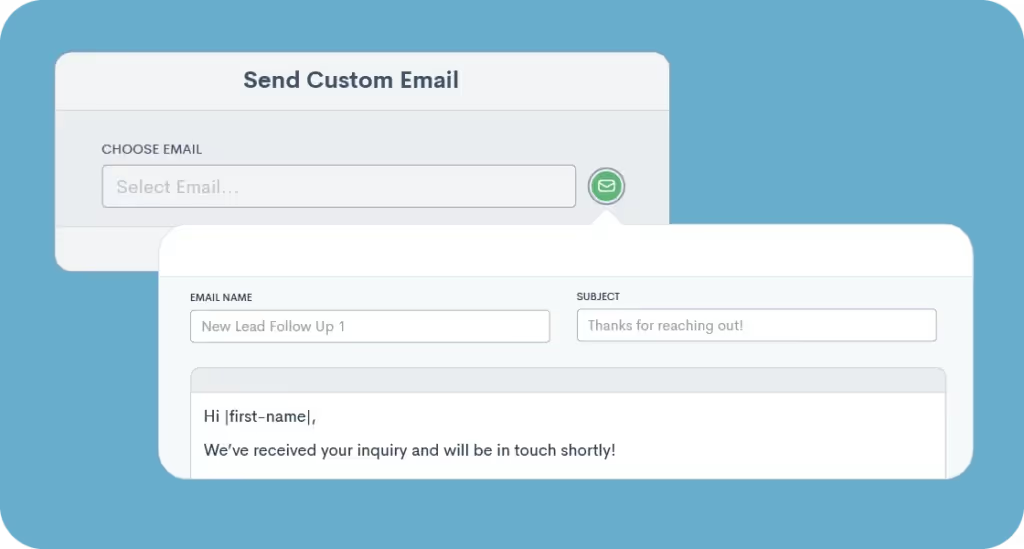
Simple yet revolutionary, our updated UX includes the ability to create assets and objects from the screen where you want to use them. No more clicking through different menus just to find your way back again. Make your vision come to life with just one click.
A helping hand to create stronger emails
![LM[AI] helping write an email](https://cdn.prod.website-files.com/688005f0c89682201c6776e9/68d1da217b1eeab82abfa8da_68a8d8461650372543d69ae8_Wrapped_Blog-Image-02.avif)
Our award-winning artificial intelligence email-drafting assistant eliminates the blank page problem. LM[AI] takes you straight from brainstorming to editing, helping you get through your marketing content and correspondence even faster.
Simplified client communication
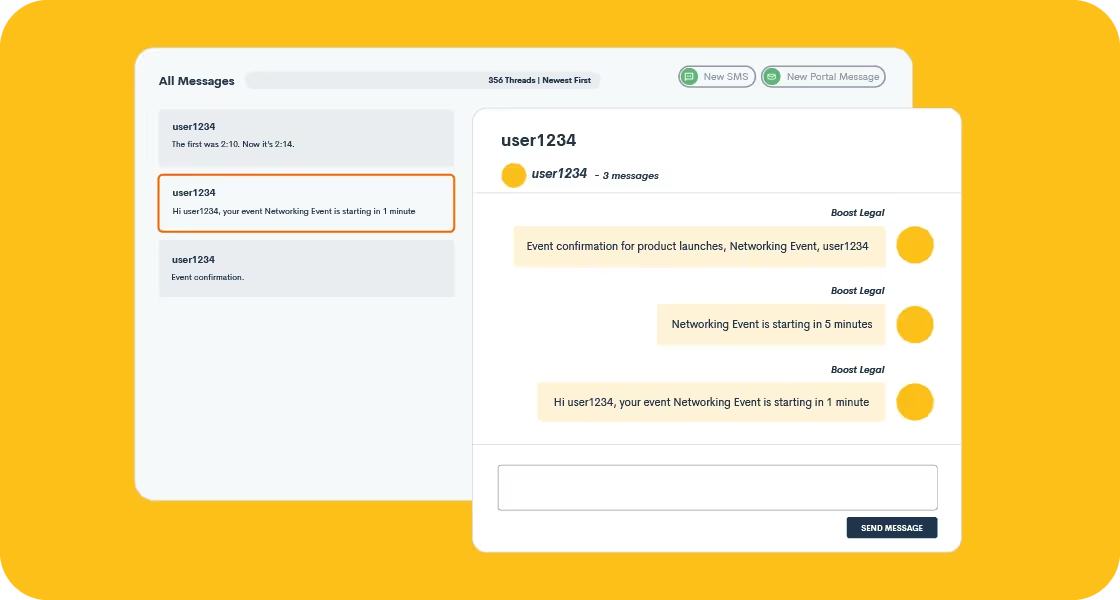
The new Lawmatics Message Center consolidates much of your correspondence with clients. View, filter, sort, and send SMS and Client Portal messages all from one organized hub.This just scratches the surface of all we’ve added to the CRM this year. We overhauled Tasks, introduced a whole new way to manage your events and appointments, optimized conflict checking, and more. Want a full debrief on our releases this year? Check out our recent Deep Dive webinar where we recap the highlights.
Started new partnerships
We connected with so many inspiring people from both the legal and tech worlds this year. With so many brilliant minds in our community, we love putting our heads together to improve the business of law and increase access to justice. From engineering integrations to promoting social good, here are some highlights.
Build more robust integrations with Zapier

Simplify data management by syncing Companies, as well as Contacts and Matters, to apps through Zapier. Even if we don’t have a direct integration with a platform of your choice, we still do everything we can to keep your data consistent and your process uniform.You can check out our full inventory of integrations here.
A visit from The Innocence Center

Every now and then we bring partners into our San Diego office to help us discover more of the world around us. One of our favorite visits this year was from our friends at The Innocence Center, whose mission is to free innocent people from prison, educate the public about the causes of wrongful incarceration, and assist the exonerated with reintegration into society. You can learn more about their important work here.
ABA Member Discount Program
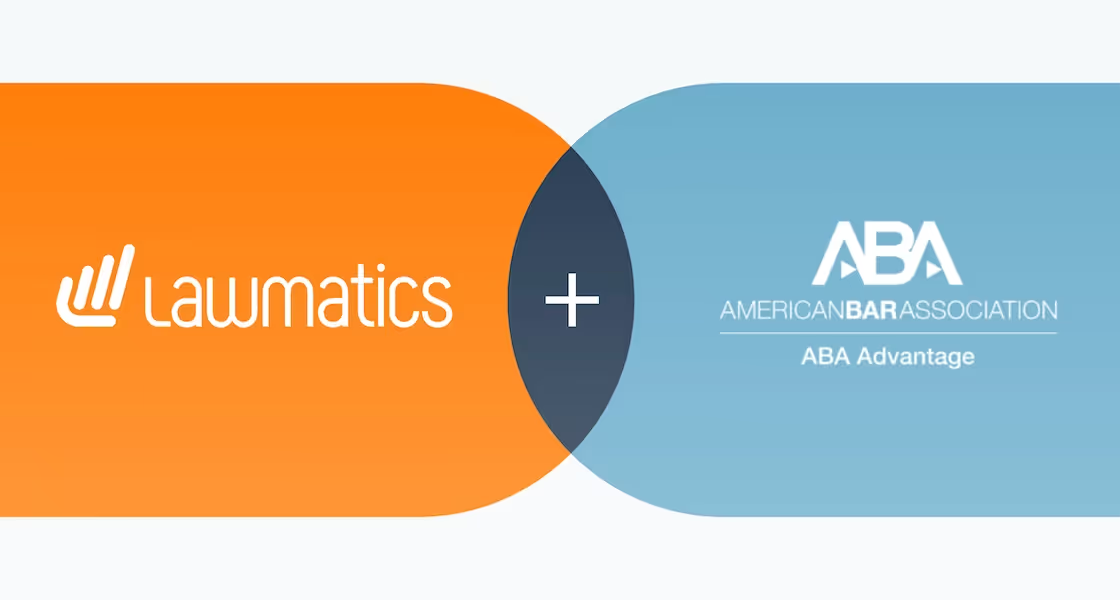
In 2023 members of the American Bar Association became eligible for a lifetime discount of Lawmatics. If you haven’t signed up for Lawmatics already, you can learn more here.
Made headlines
We felt the love in 2023 – from our customers, partners, and beyond. Here are just a few of our favorite items from the front pages this year.
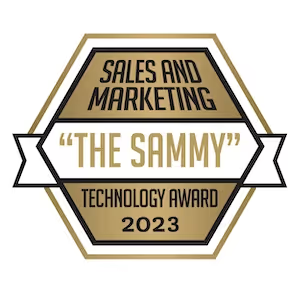
Lawmatics Wins a Sammy—2023 Sales and Marketing Innovation Technology of the Year
The #1 legal CRM was named Product of the Year by Business Intelligence Group at the 2023 Sales and Marketing Technology Awards.

LM[AI] wins LegalTech Breakthrough Award for AI Innovation of the Year
Adding AI to our platform wasn’t about having shiny bells and whistles just because they’re shiny. It was about providing a relevant, intuitive, and ethical tool to make the business of law simpler – which is why it won a LegalTech Breakthrough Award.

Lawmatics Customer Success Team Wins Bronze Stevie Award
Congrats to our tireless customer support and onboarding Lawmaticians for this recognition of their hard work and dedication to excellence!
Watched you thrive
Your success is our success. Our mission is to create a platform that empowers you to break free of busywork and focus on what matters most – your clients.We crunched the numbers to see just how much of the dredge work we’ve eliminated for you this year. As a collective, Lawmatics users achieved:
7,968,456Automation targets
1,913,772Matters created
5,373,905Files uploaded
441,327Appointments created
235,501Clients converted
235,501Clients converted
And popped up in some cool places
We travel throughout the U.S. each year to share our love for automation and the new tech age (and get our fill of karaoke!). Here are some of our favorite adventures from the year:
ClioCon 2023

ABA TECHSHOW

Beach cleanup

Susan G. Koeman MORE THAN PINK Walk

And in the end…
To close out our whirlwind 2023, we just wanted to say…thanks. Thank you for the work you do, for choosing to support Lawmatics, and for believing in a brighter, smarter future for the practice of law.If you haven’t tried Lawmatics yet, book a demo today. Do yourself a favor and discover how we can help you streamline operations, impress clients, and win more business. Let’s start 2024 on a strong note.
Subscribe to get our best content in your inbox
Ready to grow your law firm with Lawmatics?
Schedule a demo of legal’s most trusted growth platform.
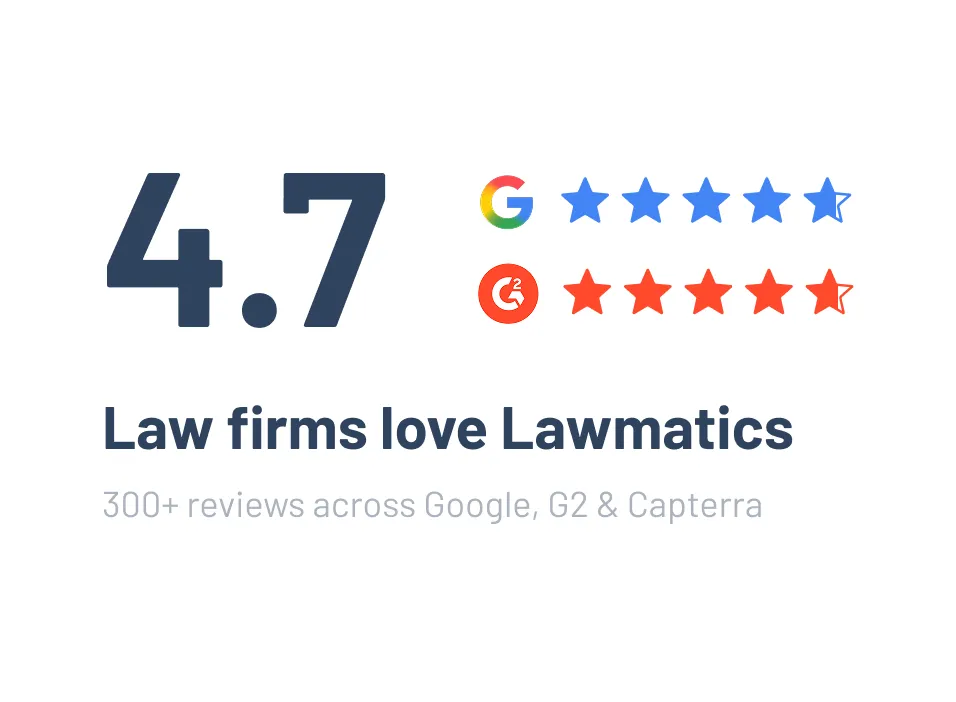




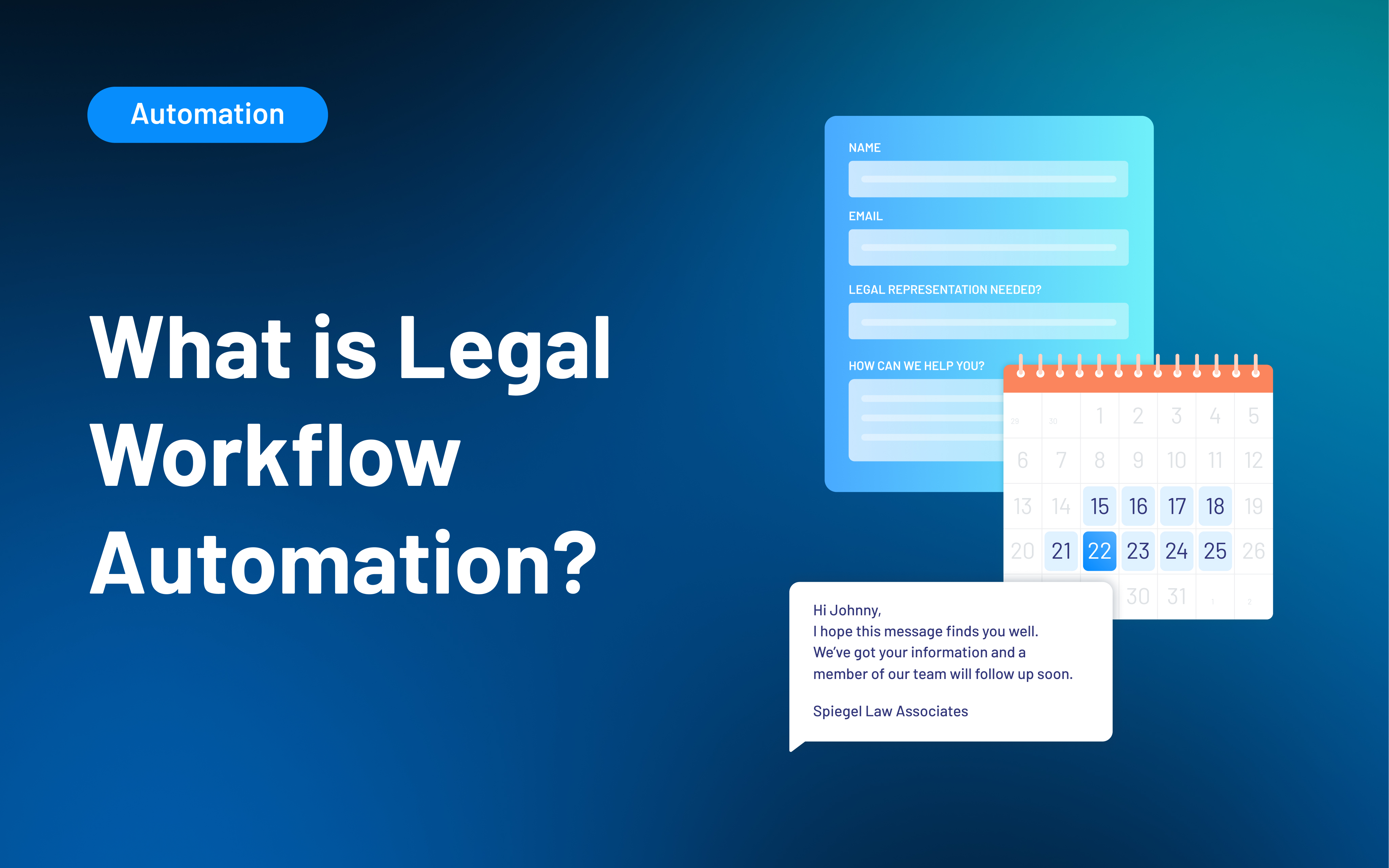


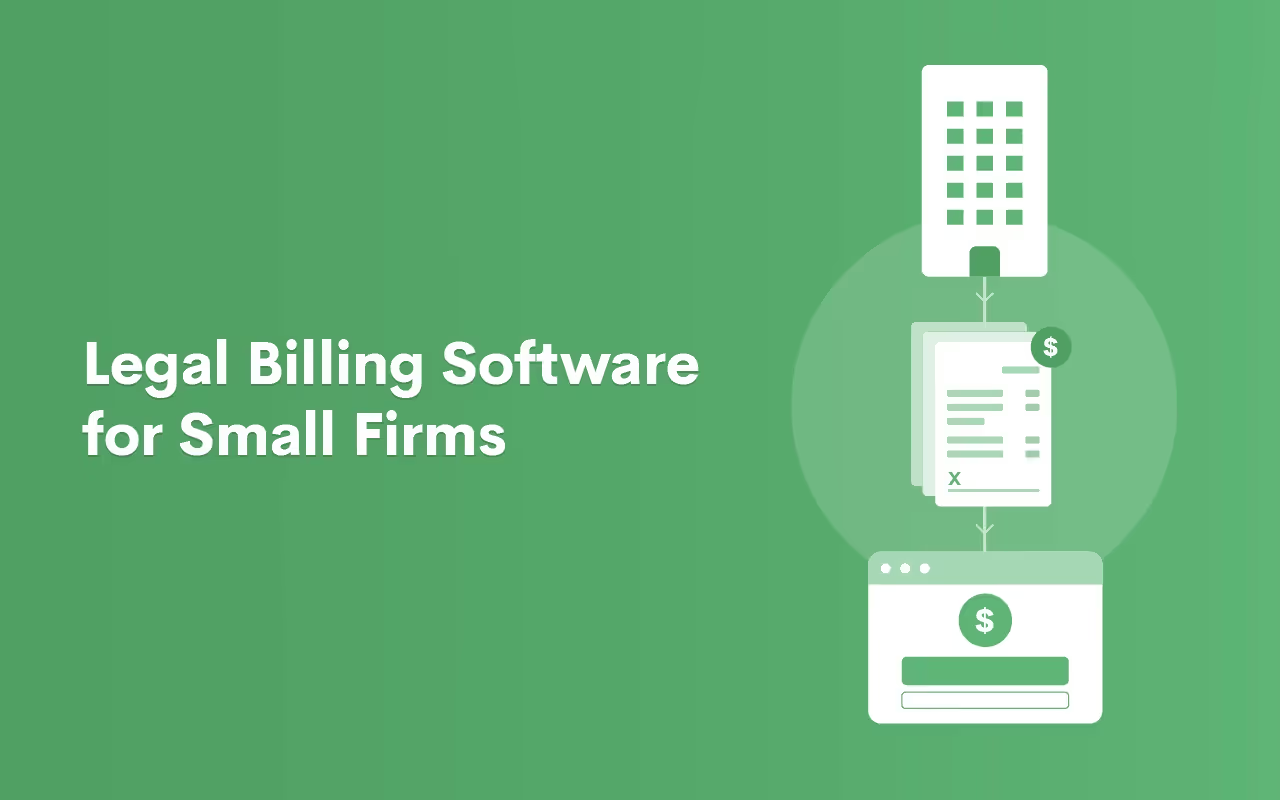
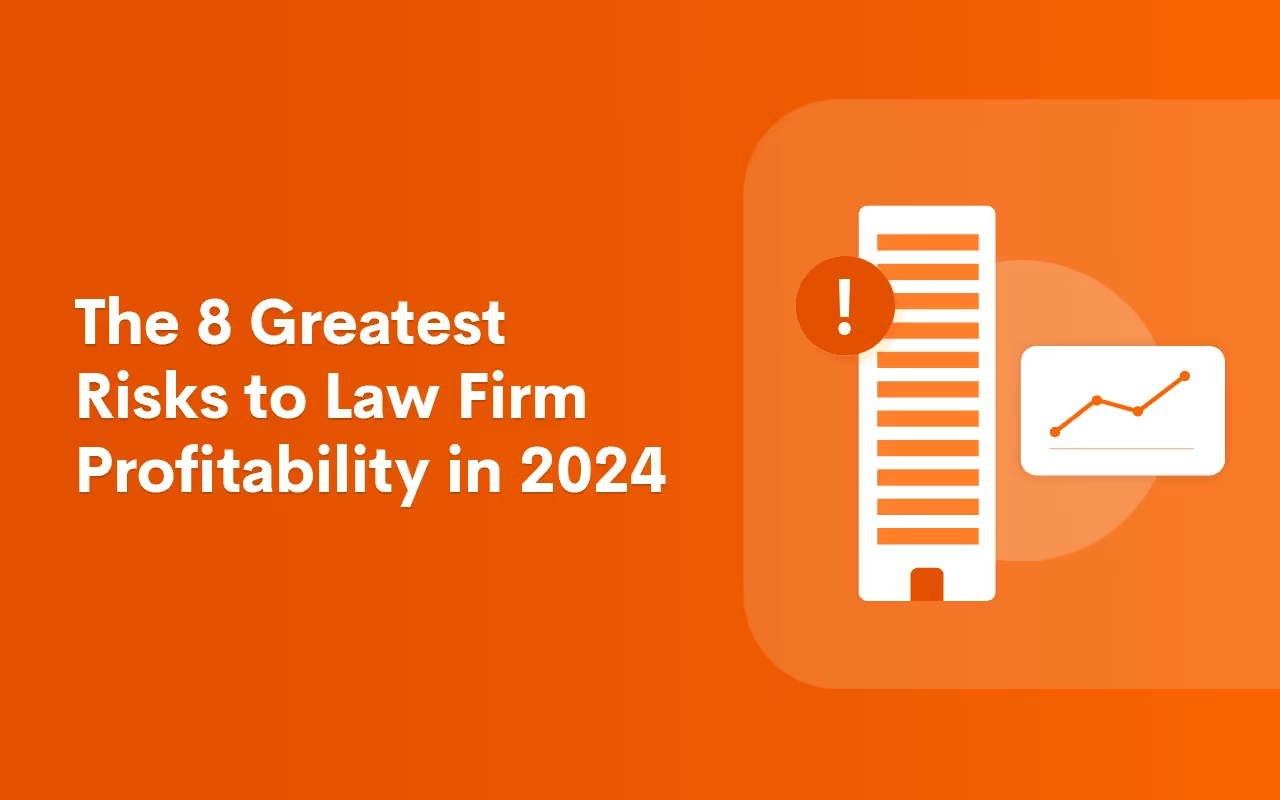
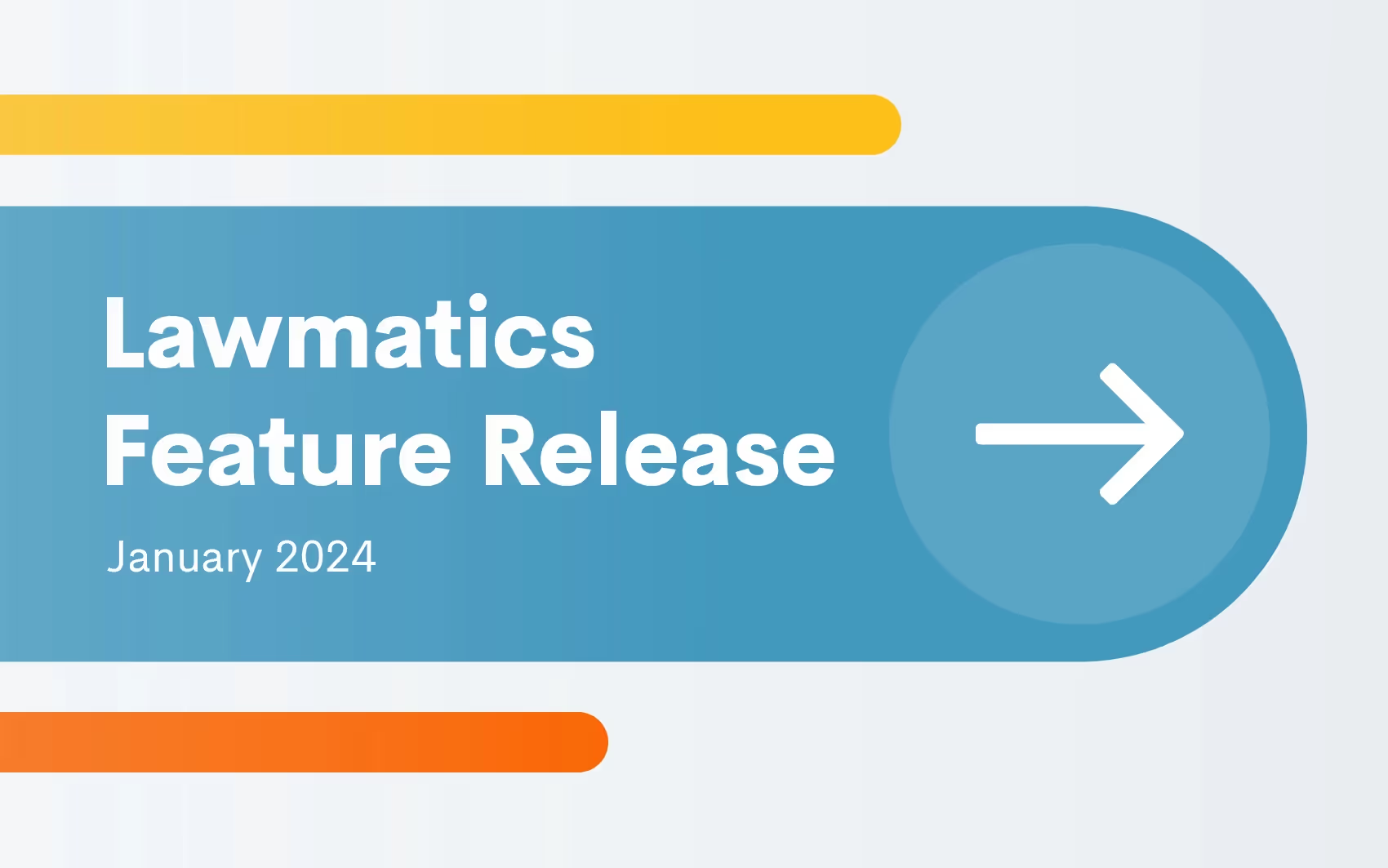


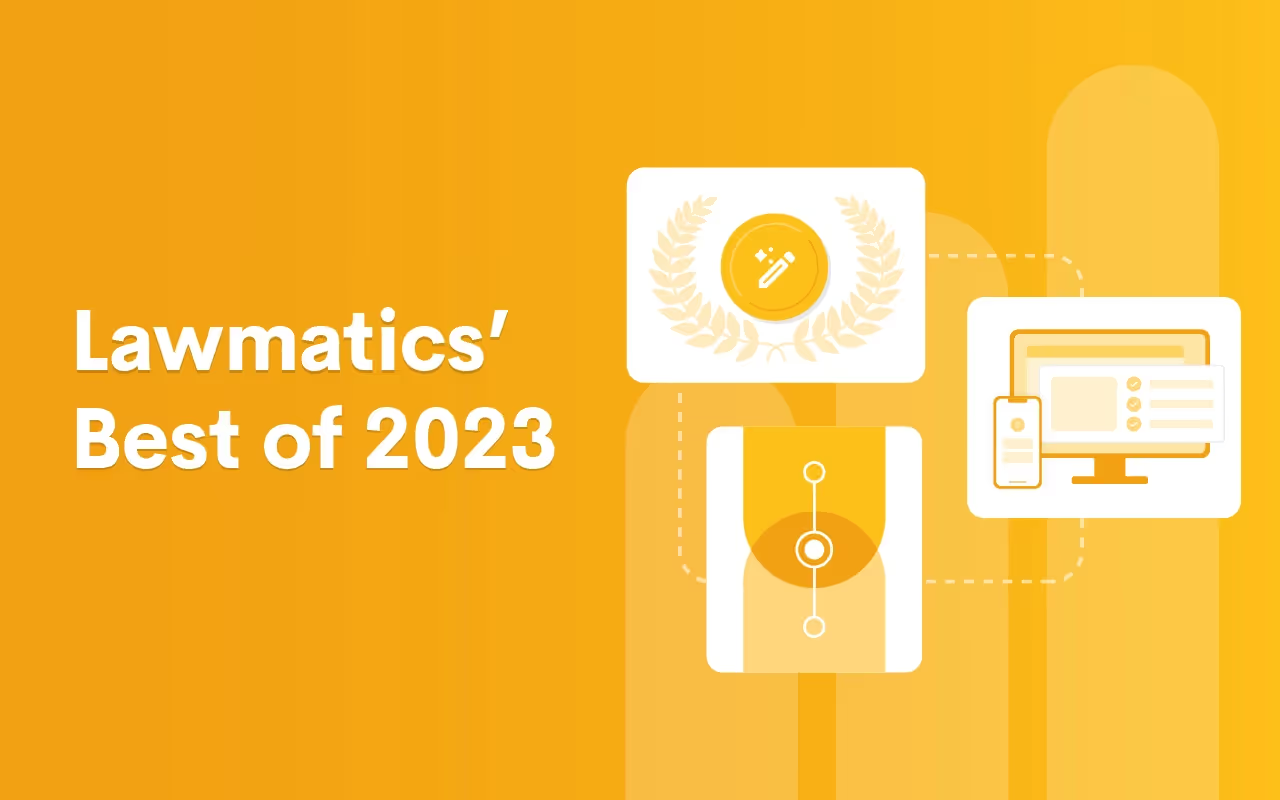
.avif)
.avif)

.avif)
